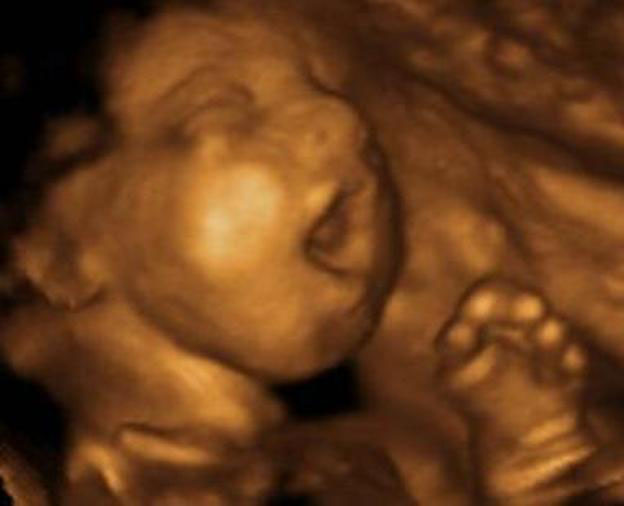The ACLU and abortion advocates don’t want women to see an ultrasound of their unborn baby before an abortion – because, when they do, many women choose life.
Earlier this year, a federal appeals court upheld a Kentucky law allowing women a chance to see an ultrasound of their unborn baby before having an abortion. Ultrasounds are generally done before abortionist to determine the age of the baby prior to the abortion, but abortion clinics normally don’t let women see their baby because they may change their mind after seeing their child.
Now the ACLU is appealing the appeals court ruling:
“This sort of extreme political interference in the doctor-patient relationship has no place in the exam room,” said Alexa Kolbi-Molinas, senior staff attorney with the ACLU Reproductive Freedom Project. “The sole purpose of this law is to shame and coerce someone who has decided to end their pregnancy.”
The ACLU also says the ruling also conflicts with an earlier decision by the Fourth Circuit Court of Appeals, which struck down an identical North Carolina law because it violated the First Amendment. Unless the Supreme Court resolves this circuit split, a doctor’s basic First Amendment rights depend solely on the state in which they practice.
Responding to the news of the filing, Gov. Bevin’s Communications Director Elizabeth Kuhn said: “Since the ultrasound law was passed, Gov. Bevin has tirelessly fought to protect the unborn by tackling every baseless legal challenge levied by the ACLU. The Sixth Circuit strongly and correctly ruled in our favor, and it is doubtful the Supreme Court will take the case. But, if they do, Gov. Bevin is ready to defend it.”
With this filing, the case becomes the third challenge to an abortion restriction pending before the Supreme Court this term.
There is no word on when the high court will decide whether or not to take up the case, but with conflicting rulings from the Fourth and Sixth Circuit Court of Appeals, the Supreme Court may take it up to resolve the differences between the two federal judicial circuits.
Click Like if you are pro-life to like the LifeNews Facebook page!
In early 2017 the Kentucky legislature passed the bill and U.S. District Court Judge David Hale struck it down shortly thereafter. Kentucky Gov. Matt Bevin appealed Judge Hale’s ruling.
In gutting the ultrasound law, which passed overwhelmingly, Judge Hale wrote, “The court recognizes that states have substantial interests in protecting fetal life and ensuring the psychological well-being and informed decision-making of pregnant women,” but added, “However, HB 2 does not advance those interests and impermissibly interferes with physicians’ First Amendment rights.”
But a federal appeals court disagreed.
Earlier this year, judges, from the 6th Circuit, ruled 2-1 that the law did not violate a doctor’s First Amendment rights to free speech, writing that the information gleaned from an ultrasound was “pertinent” to a woman’s decision-making.
“The information conveyed by an ultrasound image, its description, and the audible beating fetal heart gives a patient greater knowledge of the unborn life inside her,” wrote John Bush, a nominee of President Trump. “This also inherently provides the patient with more knowledge about the effect of an abortion procedure: it shows her what, or whom, she is consenting to terminate.”
According to the Associated Press, attorneys from the ACLU, maintained that HB 2 forces abortionists to “deliver ‘ideological’ messages to their patients, even when it’s against a patient’s wishes,” a violating of the abortionist’s’ First Amendment rights.
The law would require abortion center staff to display the ultrasound image for the woman and describe the dimensions of her unborn baby and the presence of internal organs, if seen, according to the Associated Press. The bill includes fines of up to $100,000 for the first offense and $250,000 for subsequent offenses if abortion doctors violate the law by failing to give women the opportunity to see the ultrasound of their unborn child, the report states.
During consideration of the bill, state Sen. Whitney Westerfield, R-Hopkinsville, who sponsored the bill, explained why the measure was so important. He said a friend of his shared her abortion story with him and told him how an abortion clinic nurse refused to let her see her unborn child on the ultrasound screen.
“She regrets to this day not being able to see it —knowing now, feeling certain, that had she been able to see it, had she been allowed to see it — she wouldn’t have made the decision that she did,” Westerfield said. “Regardless of everyone’s position on abortion in this chamber, I think we can all agree that fewer is better.”
In attempt to mock the ultrasound bill, a Kentucky Democratic representative also introduced a bill to require men to swear on the Bible to be faithful to their wives before receiving erectile dysfunction prescriptions.

Please click here to read the full story.
Author: Steven Ertelt




